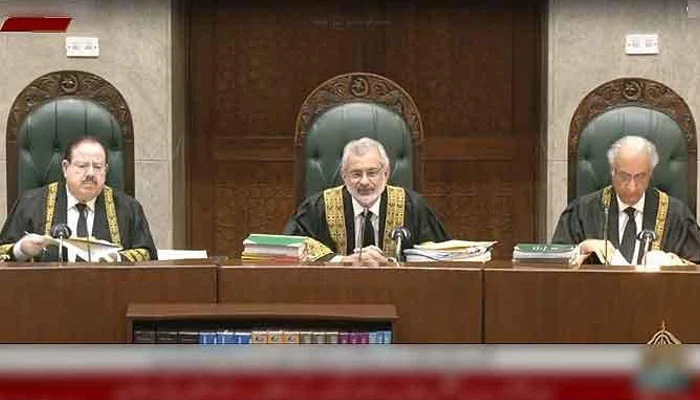10-5 Majority Backs Bill Restricting CJP Powers, Retrospective Law Provision Removed

In a significant development, the Supreme Court has upheld the constitutional validity of the Supreme Court (Practice and Procedure) Act 2023, which governs the powers of the Chief Justice. This decision was reached with a 10-5 majority vote in favor.
The full court, consisting of all 15 judges of the apex court, had reserved its verdict after conducting five exhaustive hearings on challenges to the law.
Chief Justice Isa, while delivering the verdict, acknowledged that five members of the bench, including Justices Ijazul Ahsan, Muneeb Akhtar, Sayyed Mazahir Ali Akbar Naqvi, Ayesha A Malik, and Shahid Waheed, had opposed the law.
The key outcomes of the verdict are as follows:
– Sub-section (2) of section 5 of the Act, which grants the right of appeal retrospectively, was declared ultra vires the Constitution by a majority of 8-7. The judges in dissent included CJP Isa, Justice Sardar Tariq Masood, Justice Syed Mansoor Ali Shah, Justice Amin-ud-Din Khan, Justice Jamal Khan Mandokhail, Justice Athar Minallah, and Justice Musarrat Hilali.
– Sub-section (1) of section 5 of the Act, which grants the right of appeal prospectively, was declared in accordance with the Constitution by a majority of 9-6, with Justices Ahsan, Akhtar, Yahya Afridi, Naqvi, Malik, and Waheed in dissent.
The verdict explicitly recognizes the parliament’s authority to legislate under Article 191, which stipulates that Supreme Court rules are subject to the Constitution.
Effective from April 21, 2023, the day of its enactment, the law allows for the review of Supreme Court verdicts issued under Article 184(3) after this date.
Understanding the Law
The 2023 Act grants the power of taking suo motu notice to a three-member committee, including senior judges and the Chief Justice, aiming to ensure transparent proceedings in the apex court and providing the right to appeal.
Regarding the constitution of benches, the Act mandates that every case, matter, or appeal before the apex court must be heard and decided by a committee constituted by the Chief Justice and the two senior judges. The decisions of the committee are made by majority vote.
For matters invoking the use of Article 184(3) concerning the interpretation of the Constitution, a bench comprising no fewer than five apex court judges must be formed.
Appeals for any verdict by an apex court bench that exercises Article 184(3) jurisdiction are allowed within 30 days of the bench’s order, to a larger Supreme Court bench. The appeal should be scheduled for a hearing within 14 days from the date of its filing.
The law also guarantees the right of parties to appoint their chosen counsel for filing a review application under Article 188 of the Constitution. Additionally, it stipulates that applications pleading urgency or seeking interim relief should be heard within 14 days from the date of filing.
However, the provision for retrospective appeal rights for aggrieved individuals against whom an order was made under Article 184(3) before the Act’s commencement was struck down by the court.
Promoting Cooperation and Independence
Before concluding the hearing, Chief Justice Isa emphasized the need for cooperation between the parliament and the Supreme Court, stressing that both institutions should not be viewed as adversaries. He encouraged a spirit of “live and let live” and urged everyone to focus on the present rather than predicting the future.
In a similar vein, the Attorney General argued that both the parliament and the Supreme Court are not enemies but entities that should work together. He discussed the principles of independence of the judiciary and the legislature’s authority to legislate under Article 191.
The lively discussions in court addressed various aspects of the law, its implications, and the balance of power between the parliament and the judiciary. The proceedings highlighted the complexities of interpreting the Constitution and its relationship with legislation.







Its like you read my mind You appear to know so much about this like you wrote the book in it or something I think that you can do with a few pics to drive the message home a little bit but instead of that this is excellent blog A fantastic read Ill certainly be back
I do believe all the ideas youve presented for your post They are really convincing and will certainly work Nonetheless the posts are too short for novices May just you please lengthen them a little from subsequent time Thanks for the post
Its like you read my mind You appear to know a lot about this like you wrote the book in it or something I think that you could do with some pics to drive the message home a little bit but instead of that this is fantastic blog An excellent read I will certainly be back